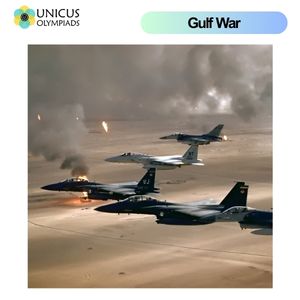

The Gulf War, also known as the First Gulf War or the 1990–1991 Gulf War, was a major conflict that had far-reaching implications for the Middle East, global politics, and international relations. The war was triggered by Iraq's invasion of Kuwait in August 1990, and it involved a coalition of forces led by the United States against Iraq. The Gulf War was notable for its rapid military actions, the use of advanced technology, and the widespread media coverage. In this article, we will explore how the Gulf War impacted the world, focusing on its political, economic, military, and cultural consequences.

The immediate cause of the Gulf War was Iraq’s invasion of its neighbor, Kuwait, on August 2, 1990. Iraqi President Saddam Hussein justified the invasion by claiming that Kuwait was historically part of Iraq and accusing Kuwait of overproducing oil, which he argued was damaging to Iraq’s economy. Additionally, Hussein sought to gain control over Kuwait's vast oil reserves and increase Iraq’s power in the region.
The United Nations (UN) quickly condemned the invasion and imposed economic sanctions on Iraq. The UN Security Council passed resolutions demanding Iraq’s withdrawal from Kuwait and authorizing the use of force if Iraq did not comply. The United States, under President George H.W. Bush, led a coalition of nations, including the UK, France, Saudi Arabia, and several other Arab and Western countries, to expel Iraqi forces from Kuwait.
The Gulf War saw a coalition of forces, led by the United States, launch Operation Desert Storm in January 1991 after a deadline for Iraq’s withdrawal from Kuwait passed. The coalition forces used overwhelming air power and precision bombing to destroy Iraq’s military infrastructure, including command centers, air defense systems, and tanks. This was followed by a swift ground offensive that liberated Kuwait in less than 100 hours.
The Gulf War marked the first large-scale use of advanced military technologies such as precision-guided munitions (smart bombs), stealth bombers, and satellite communication systems. The coalition forces demonstrated the effectiveness of these technologies, which allowed them to carry out highly accurate strikes while minimizing civilian casualties.
The Gulf War resulted in significant casualties, with thousands of soldiers and civilians killed or wounded. The environmental impact of the war was also severe, particularly the burning of Kuwaiti oil wells by retreating Iraqi forces, which led to massive air pollution and ecological damage in the region.
The Gulf War significantly strengthened the role of the United States in the Middle East. The U.S. led coalition in the war reinforced its position as the dominant global superpower in the post-Cold War era, and it solidified its military presence in the region. The war also marked a turning point in U.S. relations with many Middle Eastern countries, including Saudi Arabia, which became a key U.S. ally in the region.
The Gulf War had a major impact on the Soviet Union, which was undergoing significant political and economic turmoil in the early 1990s. The USSR, under Mikhail Gorbachev, played a key role in supporting UN sanctions against Iraq, signaling a shift in the global balance of power after the Cold War. Although the war was not directly responsible for the collapse of the Soviet Union, it demonstrated the USSR’s diminishing influence on global affairs, contributing to its eventual disintegration in December 1991.
Although Iraq was defeated militarily in the Gulf War, Saddam Hussein remained in power. The war resulted in the imposition of harsh economic sanctions on Iraq, which led to widespread suffering among the Iraqi population. Saddam’s brutal crackdown on Kurdish and Shia uprisings in the aftermath of the war further cemented his reputation as a dictator. The Gulf War set the stage for future conflicts in the region, including the 2003 Iraq War.
The Gulf War highlighted the instability of the Middle East and the challenges of maintaining peace in the region. While the war liberated Kuwait, it also left lingering tensions between Iraq and its neighbors, particularly Saudi Arabia and Iran. The war’s aftermath contributed to a volatile geopolitical landscape that continues to affect Middle Eastern relations today.
The Gulf region is home to some of the largest oil reserves in the world, and the Gulf War had significant implications for global oil markets. The disruption of oil production and exports from Iraq and Kuwait caused a spike in global oil prices, which had economic repercussions worldwide. The war also underscored the strategic importance of the region’s oil supply for global economic stability.
The Gulf War was one of the first conflicts to be covered extensively by live television broadcasts. Media coverage brought the realities of war into people’s homes, with footage of bombings, military actions, and the experiences of soldiers being shown globally. This unprecedented media presence earned the war the nickname "The First Video War."